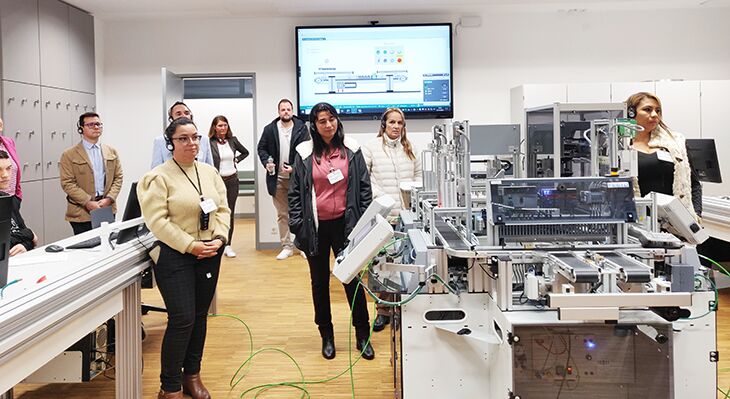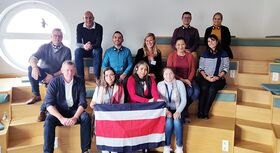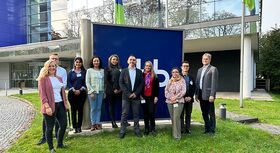IT + VET: perfect for the future!
28.11.2023
At the end of October, a Costa Rican delegation learnt about VET in the areas of IT and cyber security. Together with GOVET, participants from the Instituto Nacional de Aprendizaje (INA) visited companies and institutions to discover more about the various training opportunities.

As part of the bilateral cooperation between Germany and Costa Rica, GOVET once again organised an extensive programme of visits for the Instituto Nacional de Aprendizaje (INA), the government provider of initial and continuing vocational education and training offers in Costa Rica. This time the focus was to be VET in the IT sector. IT is an emerging economic sector in Costa Rica and is therefore hugely relevant in terms of the ongoing implementation of dual training in the country.
At the Carl-Reuther Berufskolleg in Hennef, members of the delegation learned about how company-based training is supported by the vocational school as a learning location. The team led by headteacher Thomas Heußner and Alexa Sauer gave a clear demonstration of how they link together theory and practice at the vocational school and how they also work with case studies and practical exercises in the classroom. Thomas Heußner underlined the responsibility of vocational schools in ensuring the quality of VET.
The delegation from Costa Rica were very impressed by the visit to the headquarters of Deutsche Telekom AG in Bonn. Deutsche Telekom is Europe's largest telecommunications company and operates in over 50 countries worldwide. Marcus Gastmann is a study and learning facilitator and, together with a colleague, he introduced the huge portfolio of IT training occupations at Deutsche Telekom – these range from IT system managers and digitalisation managers to IT systems electronics technicians and information technology specialists in all four specialisms. The latter were represented by two trainees who shared some interesting aspects of their day-to-day training with the guests from Costa Rica and outlined the specific offers from the company. One of these is the opportunity to participate in the “Cyber Security Professional” continuing training programme and in doing so to acquire a Chamber of Industry and Commerce additional qualification. Deutsche Telekom AG also offers dual study courses in addition to the extensive offer in the dual training occupations.

The Computing Centre at the University of Cologne is taking similar innovative approaches to retaining trainees and dual students. In recent years training has been broadened out across the different departments in order to further increase the variety for the young trainees.
The numerous different ways in which Chambers are involved in VET became clear during a visit to the Cologne Chamber of Commerce and Industry. Cologne is the fifth largest Chamber of Commerce and Industry in Germany. It is the point of contact for a number of major companies but also many small and medium-sized enterprises One of the subjects forming the focus of the interesting exchange of view and ideas was the shortage of trainees and skilled workers in Germany. This touched on a range of innovative offers from the Chamber of Commerce and Industry for companies and those seeking training such as the training hotline, “speed dating”, and the peer-to-peer programme from the training ambassadors.
Participants also really enjoyed their visit to Telonic GmbH – a medium-sized system house specialising in networks and IT security Company owner Andreas Schlechter explained how he was initially sceptical about training in his own company. The numbers, however, caused him to change his view: the company has been providing training since 2015 and most trainees stay with the company. Today, the company has 180 staff and over 15 trainees.

The relevance of the topic of cyber security was demonstrated by representatives from the Federal Office for Information Security (BSI) – the German government's cyber security authority – and from Cyber Security Cluster Bonn e.V. The Cyber Security Cluster Bonn brings together organizations and experts from business, academia and government authorities and in doing so promotes cooperation and the transfer of knowledge, and also supports the next generation of young workers and training in the area of cyber security.
At BIBB itself, the security of the IT infrastructure also has a key role to play. Trainees in the areas of information technology, specializing in systems integration and applications development, take on responsibility at an early stage in the Central Services Department and are regarded as fully-fledged colleagues. Besides creating and maintaining databases and IT infrastructure, their task profile also includes the work of IT administrators.